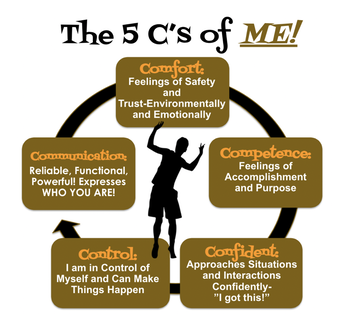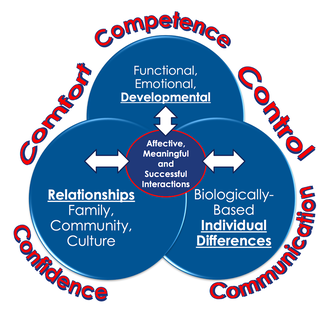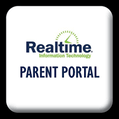Foundational Capacities for Development (FCD®)
Development is never straightforward. Neither is intervention. Despite research advances made in the last decade, attempts to translate these into best practice(s) face many challenges and obstacles. While early identification now has some reliable tools and clinical trials are underway in early intervention, it is not yet possible to capture the complexity of autism spectrum disorders and the variability in how different children respond to different interventions, especially as children grow older and become adolescents or adults and outcomes vary so widely. Identifying the potential capacities of each person and guiding their development to realize this potential is the most important goal we have.
We believe development advances when experience captures the child’s effects and interests and activates new learning, gets organized through interactions, and is integrated into the child’s repertoire of thinking, feeling, and functioning. These experiences build the foundational capacities to support development across the lifespan (“Foundational Capacities for Development” or FCD™). They are integrative capacities that go beyond specific sensory-motor processing and environmental challenges, as they are more fundamental, dynamic, and interactive and underlie how and to what degree they effectively integrate the experience to advance development. The FCD’s are pivotal in developing competencies where movement, motor planning, visual-spatial thinking, motor sequences, and communication lead to increased availability to, and participation in, the world around them to increase developmental success and independence.
We believe development advances when experience captures the child’s effects and interests and activates new learning, gets organized through interactions, and is integrated into the child’s repertoire of thinking, feeling, and functioning. These experiences build the foundational capacities to support development across the lifespan (“Foundational Capacities for Development” or FCD™). They are integrative capacities that go beyond specific sensory-motor processing and environmental challenges, as they are more fundamental, dynamic, and interactive and underlie how and to what degree they effectively integrate the experience to advance development. The FCD’s are pivotal in developing competencies where movement, motor planning, visual-spatial thinking, motor sequences, and communication lead to increased availability to, and participation in, the world around them to increase developmental success and independence.
The 5 C's
The Foundational Capacities for Development (FCD) provide the construct for adapting experiences, strategies and intervention programs to allow each individual to realize his or her developmental potential. This often starts with the adults in an individual’s life adapting their responses to foster feelings of Comfort, Competency, Confidence, Control and Communication (5 C's).
|
COMPETENCY
|
CONFIDENCE
|
|
CONTROL
|
COMMUNICATION
|
|
Foundational Capacities for Development allow us to tailor the environment, interactions, and experiences in a way that fosters each student’s feelings of Comfort, Competency, Confidence, Control and Communication (5 C's) as foundational capacities that support development through the Functional, Emotional, Developmental Levels (FEDL’s).
Semi-structured and structured activities designed to foster feelings of COMFORT, COMPETENCE, CONFIDENCE, CONTROL AND COMMUNICATION = The reduction of stress and abilities realized!
Setting up successful interactions = CONFIDENCE! |
Because every child, family system, and environment is unique, modifications and adaptations to intervention goals and programs must also be flexible to recognize and support the individual needs of each individual at various stages of development.
For over 40 years, the Developmental, Individual Difference, Relationship-based Model has changed the lives of thousands of families and professionals caring for individuals with special needs. Over the last two decades, we have learned, and research supports, that the complex sensory and motor systems of people with autism and other challenges in relating and communicating require a dynamic, not static, approach to intervention. The Developmental, Individual Difference, Relationship-based Model provides a clear guide for development based on the Functional Emotional Developmental Levels (FEDL). We know that relationships are our most vital mechanism for promoting developmental progress. We also respect that other factors play a role in the child and caregiver’s ability to deepen the quality of their relationship to support some areas of development.
For over 40 years, the Developmental, Individual Difference, Relationship-based Model has changed the lives of thousands of families and professionals caring for individuals with special needs. Over the last two decades, we have learned, and research supports, that the complex sensory and motor systems of people with autism and other challenges in relating and communicating require a dynamic, not static, approach to intervention. The Developmental, Individual Difference, Relationship-based Model provides a clear guide for development based on the Functional Emotional Developmental Levels (FEDL). We know that relationships are our most vital mechanism for promoting developmental progress. We also respect that other factors play a role in the child and caregiver’s ability to deepen the quality of their relationship to support some areas of development.




